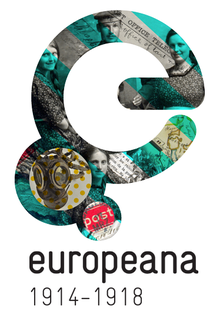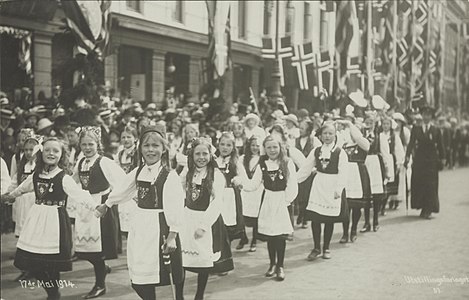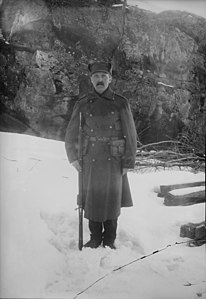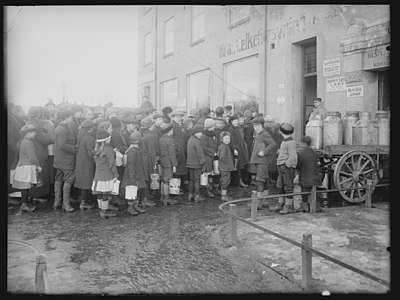Europeana/1914-18/Wikimedia Norge
-
Girls celebrating Norwegian Constitution Day, 17 May 1914
-
Russian POWs at Kristiania Central Station.
-
Guard at Oscarsborg Fortess 1917
-
Children queuing for milk Kristiania 1918
-
DS Thorunn, captured by UC-79 May 1917
-
German children arriving in Kristiania during the First World War
Theme[edit]
Norway often referred to as The Neutral Ally during World War I. The term was coined by Norwegian historian Olav Riste in the 1960s. During the dissolution of the union between Norway and Sweden there was a legitimate fear that the region would be drawn into a larger conflict, Norway having strong links with the United Kingdom and Sweden with Germany. During the first months of World War I there was a large diplomatic effort between the Scandinavian countries to ensure their common neutrality. Norway was dependent on imports, such as oil and coal from the Western Allies. Access to these supplies from the Western Allies were secured in exchange for less trade with Germany meant that Norway became closer and closer connected to the Western Allies as the War progressed.
Because of the strong trade links and sympathies with the United Kingdom the Norwegian neutrality was screwed towards the Western Allies. For example with most of the Norwegian merchant fleet, which was one of the largest in the world was heavily involved in transporting supplies to the Western Allies. Favouring the Western Allies became even more pronounced after the Tonnage Agreement in 1917 and Germany instituting unrestricted submarine warfare. During the War Norway lost around 889 merchant ships and over 2000 sailors.[1] In addition Norway was pressured by both sides in a large scale economic war for Norwegian resources, such as fish, minerals etc.
In addition there were a number of Norwegians and the Norwegian diaspora who joined up (predominantly with the Western Allies) to fight in the War.
In the Europeana 1914–18 online campaign Wikimedia Norge is focusing on how Norway, after the dissolution of the union between Norway and Sweden in 1905, was focused on nation-building and constructing and structuring a national identity. One example is the building important infrastructure (for example building railways and hydro power stations). At the same time the Norwegian public was accutely aware of the war raging outside by the presence of interned soldiers and sailors, spying, goods shortages and the loss of merchant ships and sailors.
Portal: World War I on Wikipedia (Norwegian bokmål)
Outcomes[edit]

During the Europeana 1914–18 online campaign and during previous activities we have:
- added 4805 images
- added 102 articles during editing contests
- added 816 sources during editing contests
- uploaded 70 documents to Transcribing Europeana 1914-1918
- 46 documents from Sigrid Undset of which 9 % are transcribed
- 14 documents to and from Roald Amundsen of which 50 % are transcribed
- 11 documents from Vidkun Quisling of which 100 % are transcribed
The Europeana 1914–18 online campaign has also given us the opportunity to approach our existing Glam partners with an already set project where the theme and rules are decided by the Europeana organizers. Wikimedia Norge is a small chapter and initiatives like challenges from Europeana helps us save time and is easier to pitch to our partners. Even though this is not part of our portfolio, we would also like to report that as a result of our activities in this campaign we can apply for funding for transcribing from The Arts Council, and will do so together with The National Archive and Wikimedia Armenia in September 2017. In that way this campaign has helped us be eligible to apply for funding for transcribing.
Partners[edit]
Our partners in the Europeana challenge 1914-1918 were K-lab and The National Library
- K-lab: K-lab is a cooperation between with Norwegian Mapping Authority, The Arts Council Norway, Directorate for Cultural Heritage and The National Archives, with focus on making public data on cultural heritage and related geographical data more accessible, while also facilitating innovation through its reuse. K-lab have helped with organizing all activities and hosts the workshop 19 June. The National Archive has donated the Quisling letters and uploaded these and the collection of letters from The National Library to transcribathon.com. Images are uploaded to Wikimedia Commons from both The National Archive and The National Library. K-lab as well as volunteers helped organize the workshop on 19 June at The Arts Council.
- The Arts Council Norway hosted the workshop on June 19.
- The National Library have donated the Amundsen and Undset letters and images to Wikimedia Commons
- Europeana and Fact and Files helped us with the uploads to transcribathon.com.
Activities[edit]
These are the activities Wikimedia Norge have planned for the Europeana 1914–18 online campaign:
- workshop at The Arts Council 19 June
- online editing contest
- transcribe letters
- add images from Digitalt Museum to Wikimedia Commons
- add images from Wikimedia Commons to Wikipedia
How to take part[edit]
You are very welcome to join the workshop at The Arts Council 19 June, participate in the online editing contest, transcribe letters or add content to Wikipedia articles. If you have any other ideas or questions, please reach out to astrid@wikimedia.no!






